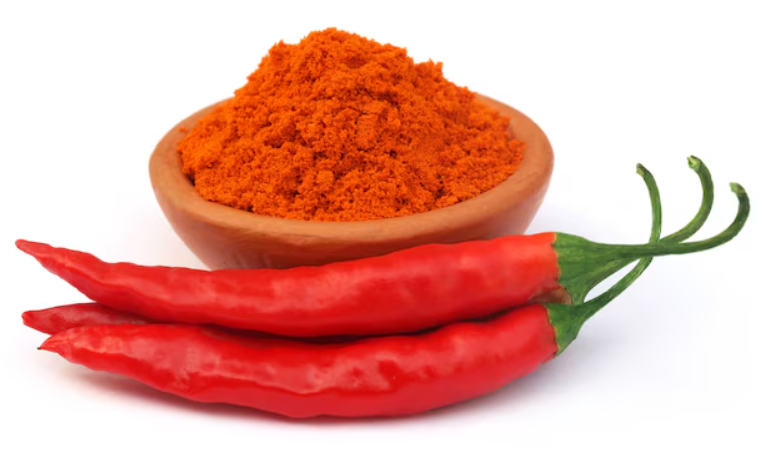Cayenne Pepper’s Health Benefits: A Hot Supplement to Your Diet
Overview of Cayenne Pepper
The bright red spice known as cayenne pepper comes from the dried and powdered pods of the Capsicum annuum plant. It has become more popular in both culinary and medicinal applications. This spice originated in Central and South America, and it has spread to many different cuisines worldwide. It is especially used as a basic component in many classic Mexican, Indian, and Cajun meals. Its unique flavour profile is defined by a strong heat that can liven up and enhance even the most basic dishes.
The Role of Capsaicin in Cayenne Pepper
Cayenne pepper’s primary ingredient, capsaicin, gives it the capacity to provide a fiery kick. This ingredient gives cayenne peppers their distinct spiciness, which varies greatly across different types, enabling a wide range of culinary uses. In addition to adding visual appeal to food, cayenne pepper’s vivid red colour indicates its potential health benefits. Because of this, people often use this spice in sauces, soups, and marinades, as well as sprinkling it over meats, seafood, and vegetables.
Profile of Nutrition in Cayenne Pepper
Cayenne Pepper’s Vitamin Content
Known for its intense heat, cayenne pepper is a bright red spice prized for both its flavour and remarkable nutritional value. The main ingredient, capsaicin, gives the spice its distinct spiciness and a host of health advantages. Regarding vitamins, cayenne pepper is especially abundant in vitamin A, which is essential for immune system support and eye health. It also contains high levels of vitamin C, an antioxidant that helps the body produce collagen and strengthens its defences against infections.

Mineral Profile of Cayenne Pepper
Vitamin E, a potent antioxidant that helps prevent cell damage, is another important ingredient found in cayenne pepper. It is necessary for immune system optimisation and skin health maintenance. In addition to these vitamins, cayenne pepper contains several minerals, including potassium, which is essential for healthy blood pressure and muscular function. It also contains trace quantities of calcium, iron, and magnesium, which contribute to its reputation as a nutrient-dense spice.
Comparison with Other Spices
Due to its high capsaicin concentration, cayenne pepper stands out when compared to other widely used spices like turmeric or black pepper. While piperine, found in black pepper, has its own set of health benefits, the unique chemicals in cayenne pepper offer particular benefits for pain relief and metabolism. Similar to how turmeric is known for its curcumin concentration, few spices can compare to cayenne’s capacity to improve circulation and aid in weight reduction. These qualities make cayenne pepper a beneficial addition to nutrition, elevating its culinary appeal while securing its place in health-conscious diets.
Health Benefits of Cayenne Pepper
Metabolism Boost and Weight Management
Known for its strong taste and many health advantages, cayenne pepper is a member of the capsicum family. One of its biggest benefits is its ability to increase metabolism, making it a great addition to your diet. Studies show that the active ingredient, capsaicin, improves thermogenesis, the body’s method of producing heat. Cayenne pepper is a useful supplement for weight management, as it aids in weight reduction through an elevated metabolic rate.
Appetite Regulation and Craving Reduction
Capsaicin has shown promise in lowering cravings and regulating appetite in numerous trials, which may help people lose weight. Furthermore, cayenne pepper may help reduce inflammation and alleviate discomfort. According to scientific studies, capsaicin acts on pain receptors, providing a natural remedy for those seeking relief from ailments like arthritis or sore muscles. The usefulness of cayenne pepper is further demonstrated by its localised effects when used topically in creams or ointments.
Cardiovascular Health Benefits
Additionally, cayenne pepper provides several cardiovascular benefits. It may aid in preventing cardiovascular illnesses by enhancing circulation. Cayenne helps to lower blood pressure and may also reduce cholesterol levels, promoting heart health. You can easily integrate cayenne into your meals by using it as a spice in marinades or adding it to soups, stir-fries, and sauces. The beneficial qualities of cayenne pepper enhance both the nutritional content and flavour of your food.
Overall Health and Well-being
Cayenne pepper is a valuable and advantageous addition to your diet due to its many benefits and versatility. Including it in your meals can contribute to better overall health, making it a great choice for anyone looking to improve their diet.
How Cayenne Pepper Can Be Included in Your Diet
Adding Cayenne Pepper to Everyday Meals
With its vivid hue and noticeable heat, cayenne pepper makes a great complement to a well-rounded diet. You can start by incorporating this spice into your everyday cooking to easily include it in your meals. A sprinkle of cayenne can improve the flavour profile of soups, stews, or sauces while adding a variety of health benefits alongside its spicy sensation. Chilli, curries, and marinades are common dishes that complement cayenne pepper well, as they allow its flavour to shine.
Creative Ways to Use Cayenne Pepper
For the more adventurous, try adding cayenne pepper to homemade dips or salad dressings. To create a flavourful vinegarette that entices the senses, mix olive oil, vinegar, and a pinch of cayenne. Additionally, for an extra flavour boost, try adding cayenne to stir-fries or sprinkling it over roasted vegetables. Moderation is key when using cayenne to enjoy its benefits safely. Traditional recommendations suggest starting with small amounts—such as 1/4 to 1/2 teaspoon per serving—and gradually increasing to suit your tolerance and personal preferences.

Capsules and Supplements
While some people may prefer cayenne pepper powder, others might opt for pills or capsules. In these cases, it is crucial to follow the dosage instructions on product labels or consult a healthcare professional. Be aware of possible side effects, such as heartburn or upset stomach, in sensitive individuals. When trying cayenne for the first time, it’s best to start slowly and observe how your body reacts. Those with certain medical conditions and pregnant women should consult their doctor before incorporating cayenne pepper into their diet.
